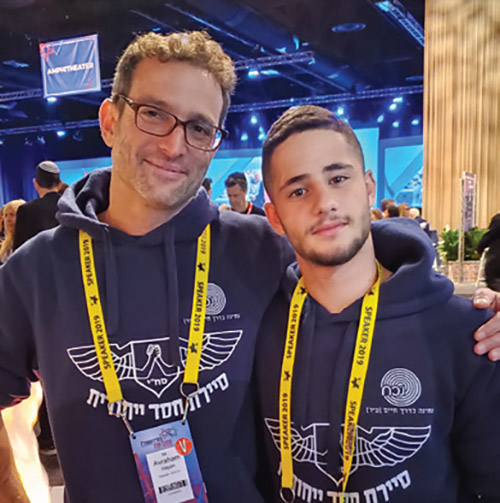
Amid the powerful political speeches at this year’s AIPAC Policy Conference was a presentation by SAHI, a chesed group established in 2009 that, according to its literature, is “an innovative social enterprise that transforms Israel’s at-risk youth through acts of giving.”
What sets SAHI apart from other organizations of this type is that it utilizes an approach that partners with these at-risk youth to help others, “rather than offering to help or change [the at-risk youth].” This approach gives these youth ownership of their actions and helps rehabilitate them by focusing on the basic Torah premise of chesed.
Avraham Hayon, one of SAHI’s founders, spoke to the AIPAC delegates on Sunday morning, and in an interview with The Jewish Link discussed this amazing organization.
“We started with street groups in poor neighborhoods in Israel. We would light a bonfire at night and wait for teenagers to join us,” said Hayon. “They would ask, ‘Who are you and why are you here?’ and we would tell them that we were there to help the neediest people in their neighborhood.”
Never mentioning that they were there to help the teens, the SAHI representatives would continue, “‘We need your help to identify these poor families and individuals because you live here. If we see someone going through the garbage, you will know where they live. We need you to identify them for us and we have created a special unit to help them. Do you want to help us?’ The answer is always yes.”
According to Hayon, it is this partnership that gets these teens involved and keeps them engaged. There is no defensiveness because they are asked to help, rather than being told that they are being helped.
Lior Elgrabli, a 16-year-old who has been with SAHI since he was 12, agreed.
“I was 12 and involved with a bad crowd,” he told The Jewish Link in broken English. “I was drinking with a friend. SAHI reached out to us and we went with them because they promised us snacks,” he said with an adorable impish grin and a wink. “The teenagers treated me like an equal. It touched me because they didn’t know me.”
Elgrabli explained that once the poor families are identified, these at-risk teens deliver food boxes to them, but in a very unique way. “We find out where they live, leave the food and knock on the door. Then we run away. It is tzedaka and chesed just like the Torah told us. They never know who we are.”
He continued, “When I do this I feel an emotion I cannot describe. I did something for someone else. I am just so touched.”
Hayon gave Elgrabli an assist with the English as he warmly patted his back. “When they do the deliveries they feel good about themselves. They feel like ‘I matter. I belong to something. I am part of this special chesed unit to do good for somebody.’”
Elgrabli then hesitantly told the rest of his personal story. “My father got sick with cancer. We needed medicine to help him but we didn’t have money. SAHI gave us food and helped us. No one knew that they were helping.”
His father’s cancer spread, eventually leaving him paralyzed. Elgrabli cared for his father’s physical needs, sleeping by his bedside every night. He even left school to dedicate his every waking moment to his father’s care.
“SAHI called every day, asking how I was and what they could do. I was depressed, but I knew that no matter how bad things got there were these guys out there who loved me and cared about me, no matter what. It was very special,” he recalled.
Unfortunately, Elgrabli’s father succumbed to his illness 18 months ago. “My family didn’t know what to do about shiva. We couldn’t believe he died,” he shared sadly. “There was a knock on the door and SAHI was there with food. They taught my family about shiva. They taught me how to say Kaddish for my father. They took me back to school.”
Now Elgrabli is looking toward his future, a future he could not have imagined four years ago. “I want every kid to experience that change. I want to change their lives like SAHI changed my life,” he said gratefully.
What does his future look like? “I want to go to the army to protect my country and my family. I want to succeed in helping at-risk teenagers. I want to change many lives like SAHI changed mine. I have a purpose. The world needs me and what I can offer.”
According to Hayon, there are currently 850 active teens participating with SAHI in the 30 branches throughout Israel, with another 10 branches set to open by the end of 2019.
“We have 160 alumni currently serving in the IDF,” he said. “We have changed their lives and they want to pay it forward.”
Hayon plans to continue the organization’s mission by bringing SAHI to the U.S. “We want to build a training and knowledge center,” he said. “We will have people with experience help take what they have learned and translate it to how it needs to work in the U.S. We will create an instruction book and a pilot program and find partners. The Chicago Federation already reached out to us, and our model and spirit are being used to empower workers at a company in Vegas,” he said.
Almost as an afterthought Hayon added, “We incorporate teens with disabilities, who are blind, and mainstream them. We use the at-risk teenagers to help those who are blind. Everyone wins.”
As he addressed the delegates that morning, Hayon had a huge smile on his face for the entirety of his presentation. As SAHI’s motto states: “The greatest thing in the world is doing good.” With that as his life’s work, it was no wonder his smile never faltered.
By Jill Kirsch











